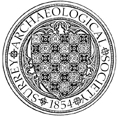Middle Mead Rapsley
Submitted by ncowlard on

Submitted by ncowlard on
This conference has been arranged in partnership with the Roman Studies Group of Surrey Archaeological Society.
Details and booking from: https://www.eventbrite.co.uk/e/disposal-of-the-dead-in-iron-age-roman-an...
This event will also be streamed live - tickets £12 from the above booking link
Dr Philip Smither, Finds Liaison Officer for Berkshire, has offered to talk to us on the subject of his PhD thesis at the University of Kent, the Roman site at Richborough. Hear about Philip's research - ‘Army Communities at Roman Richborough: An Analysis of the Roman Military Assemblage.' and how this has altered perception about this important Roman site.
This talk will take place on Zoom and is open only to RSG members. If you would like to join RSG you can join for £5 (see RSG page) if you are already a member of SyAS.
Emma Corke, Site Director of Cocks Farm Abinger, will be updating us on findings from the 2023 season on the hill adjacent to the Cock Farm Roman villa. This is part of an ongoing series of excavations related to features identified in magnetometry surveys, done as part of a villa estate research project.
This talk will take place on Zoom and is open only to RSG members. If you would like to join RSG you can join for £5 (see RSG page) if you are already a member of SyAS.
Dr. Tim Young is a Teaching Associate at the School of History, Archaeology and Religion, Cardiff Unversity. His research interests include Archaeometallurgy and Geophysics.
Following on from a successful Surrey Roman Rural Settlement Project a Roman Road Group has formed. David Calow will lead the feed-back on geophysics and excavations which have confirmed part of a previously postulated road in SW Surrey.
This talk will take place on Zoom. Whilst attendance is restricted to RSG members, if you are already a SyAS member you are welcome to join the group at a cost of £5 (see RSG page).
Our November speaker is Professor Tony King who will give a talk on ‘Meonstoke – temple or villa?’ Evidence for a Roman building on the edge of Meonstoke, in the Meon Valley near Winchester, has been known since the 1930s. Excavations since the 1980s have uncovered an aisled building with a collapsed facade and more recently an unusual hexagonal building. Research continues into its function.
The Roman Studies Group AGM will be held by Zoom and followed by a talk from David Calow, RSG Treasurer and the Society's Hon. Secretary. David will talk about two sites in which he has been closely involved:
Flexford and Godstone - two coin-rich Roman rural settlement sites in SE England
Whilst attendance is restricted to RSG members, if you are already a SyAS member you are welcome to join the group at a cost of £5 (see RSG page).
The final main season of excavation on Ashtead Common was undertaken by the Society’s Roman Studies Group in August and September this year. The ground was very dry at first at the end of the long dry spell, making excavation difficult, but it did allow work in places that would usually have been under water (and indeed were at the end of the dig). The excavation was aimed principally at completing work on the area of the newly discovered building, the Lowther villa and the tile kiln(s).
Ashtead Roman villa was first discovered in the 1920s and excavated by A. W. G. Lowther and A. R. Cotton, when extensive evidence for a tilery was also noted. Further work was carried out in the 1960s by John Hampton who carried out a site survey; the site had much less vegetation cover than is now the case. Both Lowther’s published reports and Hampton's survey left many unanswered questions aand so a new research programme was initiated in 2006, directed by Dr. David Bird.